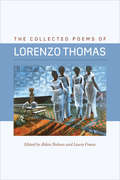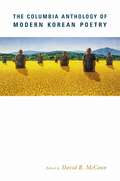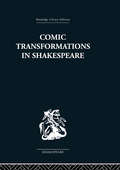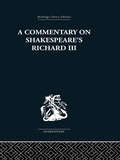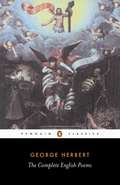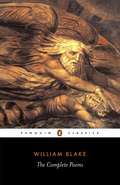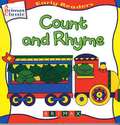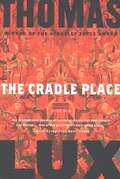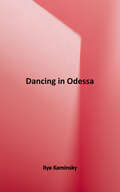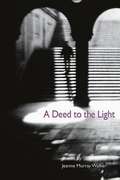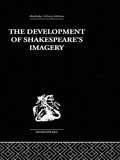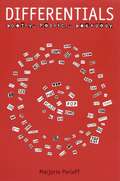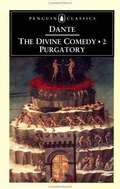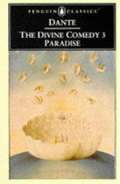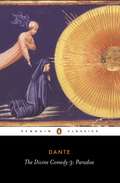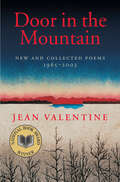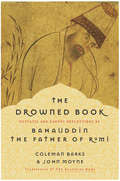- Table View
- List View
The Collected Poems of Lorenzo Thomas (Wesleyan Poetry Series)
by Lorenzo ThomasLorenzo Thomas (1944-2005) was the youngest member of the Society of Umbra, predecessor of the Black Arts Movement. The Collected Poems of Lorenzo Thomas is the first volume to encompass his entire writing life. His poetry synthesizes New York School and Black Arts aesthetics, heavily influenced by blues and jazz. In a career that spanned decades, Thomas constantly experimented with form and subject, while still writing poetry deeply rooted in the traditions of African American aesthetics. Whether drawing from his experiences during the war in Vietnam, exploring his life in the urban north and the southwest, or parodying his beloved Negritude ancestors, Thomas was a lyric innovator.
The Columbia Anthology of Modern Korean Poetry
by McCann David Ed.Korea's modern poetry is filled with many different voices and styles, subjects and views, moves and countermoves, yet it still remains relatively unknown outside of Korea itself. This is in part because the Korean language, a rich medium for poetry, has been ranked among the most difficult for English speakers to learn. The Columbia Anthology of Modern Korean Poetry is the only up-to-date representative gathering of Korean poetry from the twentieth century in English, far more generous in its selection and material than previous anthologies. It presents 228 poems by 34 modern Korean poets, including renowned poets such as So Chongju and Kim Chiha.
The Columbia Anthology of Modern Korean Poetry
by David MccannThe only up-to-date representative gathering of Korean poetry from the twentieth century in English, this volume presents 228 poems by 34 modern Korean poets, including renowned poets such as So Chongju and Kim Chiha.
Comic Transformations in Shakespeare
by Ruth NevoFirst published in 1980. In this study of Shakespeare's ten early comedies, from The Comedy of Errors to Twelfth Night, the concept of a dynamic of comic form is developed; the Falstaff plays are seen as a watershed, and the emergence of new comic protagonists - the resourceful, anti-romantic romantic heroine and the Fool - as the summit of the achievement. The plays are explored from three complementary perspectives - theoretical, developmental and interpretative which lead to a further understanding of the powerful relation between the plays' formal complexity and their naturalistic verisimilitude.
Commentary on Shakespeare's Richard III
by Wolfgang ClemenFirst published in 1968. Providing a detailed and rigorous analysis of Richard III, this Commentary reveals every nuance of meaning whilst maintaining a firm grasp on the structure of the play. The result is an outstanding lesson in the methodology of Shakespearian criticism as well as an essential study for students of the early plays of Shakespeare.
The Complete English Poems
by George HerbertGeorge Herbert combined the intellectual and the spiritual, the humble and the divine, to create some of the most moving devotional poetry in the English language. His deceptively simple verse uses the ingenious arguments typical of seventeenth-century 'metaphysical' poets, and unusual imagery drawn from musical structures, the natural world and domestic activity to explore a mosaic of Biblical themes. From the wit and wordplay of 'The Pulley' and the formal experimentation of 'Easter Wings' and 'Paradise', to the intense, highly personal relationship between man and God portrayed in 'The Collar' and 'Redemption', the works collected here show the transcendental power of divine love.
The Complete Poems
by William BlakeOne of the great English Romantic poets, William Blake (1757-1827) was an artist, poet, mystic and visionary. His work ranges from the deceptively simple and lyrical Songs of Innocence and their counterpoint Experience - which juxtapose poems such as 'The Lamb' and 'The Tyger', and 'The Blossom' and 'The Sick Rose' - to highly elaborate, apocalyptic works, such as The Four Zoas, Milton and Jerusalem. Throughout his life Blake drew on a rich heritage of philosophy, religion and myth, to create a poetic worlds illuminated by his spiritual and revolutionary beliefs that have fascinated, intrigued and enchanted readers for generations.
The Confederation Group of Canadian Poets, 1880-1897
by D.M.R. BentleyAs one of the formative periods in Canadian history, the late nineteenth century witnessed the birth of a nation, a people, and a literature. In this study of Canada's first 'school' of poets, D. M. R. Bentley combines archival work, including extensive research in periodicals and newspapers, with close readings of the work of Charles G. D. Roberts, Archibald Lampman, Bliss Carman, William Wilfred Campbell, Duncan Campbell Scott, and Frederick George Scott. Bentley chronicles the formation, reception, national and international successes, and eventual disintegration (after the 1895 'War Among the Poets') of the Confederation Group, whose poetry forever changed the perception and direction of Canadian literature. With the aid of biographical, political, and sociological analyses, Bentley's literary history delineates the group's political, aesthetic, and thematic dispositions and characteristics, and contextualizes them not only within Canadian history and politics, but also within contemporary intellectual and literary currents, including Romantic nationalism, 'Canadianism', and poetic formalism. Bentley casts new light on the poets' commonalities - such as their debt to Young Ireland, their commitment to careful workmanship, and their participation in the American mind-cure movement - as well as on their most accomplished and anthologized poems from 1880 to 1897. In the process, he presents a compelling case for the literary and historical importance of these six men and their poems in light of Canada's cultural and political past, and defends their right to be known as Canada's first poetic fraternity at a time when Canada was striving to achieve literary and national distinction. "The Confederation Group of Canadian Poets, 1880-1897" is an erudite and innovative work of literary history and critical interpretation that belongs on the bookshelf of every serious scholar of literary studies.
Count and Rhyme
by Jenny TulipThis is a counting book for the very young. Simple rhymes feature ten frogs, who play with familiar toys to show toddlers the numbers from one through ten. " Six little frogs play bat and ball. One jumps up and sits on the wall."
The Cradle Place: Poems
by Thomas LuxThe Cradle Place is the new collection from Thomas Lux, a self-described "recovering surrealist" and winner of the Kingsley Tufts Award. These fifty-two poems bring to full life the "refreshing iconoclasms" Rita Dove so admired in Lux's earlier work. His voice is plainspoken but moody, humorous and edgy, and ever surprising. These are philosophical poems that ask questions about language and intention, about the sometimes untidy connections between the human and natural worlds. In the poem "Terminal Lake," Lux undermines notions of benign nature, finding dark currents beneath the surface: "it's a huge black coin, / it's as if the real lake is drained / and this lake is the drain: gaping, language- / less, suck- and sinkhole." In the ominous "Render, Render," the narrator asks us to consider a concentration of the essences of our lives: all that is physical, spiritual, remembered, and dreamed for, melded together to make the messy self we present to the world. Lux's voice is intelligent without being bookish, urgent and unrelentingly evocative. He has long been a strong advocate for the relevance of poetry in American culture. The Los Angeles Times praises Lux for his "compelling rhythms, his biting irony, and his steady devotion to a craft that often seems thankless." As Sven Birkerts noted, "Lux may be one of the poets on whom the future of the genre depends."
The Cradle Place
by Thomas Lux"[Lux is] sui generis, his own kind of poet, unlike any of the fashions of his time." - Stanley KunitzThomas Lux is humorous, edgy, and ever surprising in The Cradle Place, his tenth collection of verse. These fifty-two poems question language and intention and the sometimes untidy connections between the human and natural worlds. Lux has long been an outspoken advocate for the relevance of poetry in American culture, and his voice is urgent and unrelentingly evocative. As Sven Birkerts has noted, "Lux may be one of the poets on whom the future of the genre depends.""A book full of arresting images . . . The natural world, as it appears here, is at first lovely . . . but turns out dangerously vanquished . . . Not since Plath has hysteria looked this kissable." - San Francisco Chronicle"Lux has a gift for the swiftly turned expression . . . Such immediacy and quirkiness will hold a reader." - Poetry"Readers will be mesmerized." - Poetry Book of the Year, Library JournalTHOMAS LUX holds the Bourne Chair in Poetry and is director of the McEver Visiting Writers Program at the Georgia Institute of Technology. He has been awarded three NEA grants and the Kingsley Tufts Award, and is a former Guggenheim Fellow. He lives in Atlanta.
The Cradle Place
by Thomas Lux"[Lux is] sui generis, his own kind of poet, unlike any of the fashions of his time." - Stanley KunitzThomas Lux is humorous, edgy, and ever surprising in The Cradle Place, his tenth collection of verse. These fifty-two poems question language and intention and the sometimes untidy connections between the human and natural worlds. Lux has long been an outspoken advocate for the relevance of poetry in American culture, and his voice is urgent and unrelentingly evocative. As Sven Birkerts has noted, "Lux may be one of the poets on whom the future of the genre depends.""A book full of arresting images . . . The natural world, as it appears here, is at first lovely . . . but turns out dangerously vanquished . . . Not since Plath has hysteria looked this kissable." - San Francisco Chronicle"Lux has a gift for the swiftly turned expression . . . Such immediacy and quirkiness will hold a reader." - Poetry"Readers will be mesmerized." - Poetry Book of the Year, Library JournalTHOMAS LUX holds the Bourne Chair in Poetry and is director of the McEver Visiting Writers Program at the Georgia Institute of Technology. He has been awarded three NEA grants and the Kingsley Tufts Award, and is a former Guggenheim Fellow. He lives in Atlanta.
The Daddy Machine
by Johnny ValentineThis is the second edition and it has extensively revised text and new art work. The first edition was published in 1994. "It had levers of purple and panels of green. It had gizmos and gadgets and more. There were silvery gears, and a big motor, too. We spread them all out on the floor. I said, "Let's make a robot, a clever machine, that can run around doing the chores! We'll design it to sweep, and to vacuum the rugs. And it might even wax all the floors!" "Oh, but I've got a better idea!" said Sue. "Who cares if the carpet is clean? Why, we'll take all these parts and invent for ourselves, the world's very first Daddy Machine."
Dancing in Odessa
by Ilyá KamínskyWinner of the 2002 Dorset Prize, and recipient of the Ruth Lilly Fellowship, Ilya Kaminsky is a recent Russian immigrant and rising poetic star. Despite the fact that he is a non-native speaker, Kaminksy's sense of rhythm and lyic surpasses that of most contemporary poets in the English language. This magical, musical book of poems draws readers into its unforgettable heart, and Carolyn Forché writes simply "I'm in awe of his gifts."
A Deed to the Light
by Jeanne Murray WalkerIn A Deed To the Light Jeanne Murray Walker asks probing questions about the depth of grief, about letting go, and about the possibility of faith. Her poems have been described by John Taylor, writing in Poetry, as "splendid, subtly erudite, uplifting, and funny."
The Development of Shakespeare's Imagery (University Paperbacks Ser.)
by Wolfgang ClemenFirst published in 1951. The edition reprints the second, updated, edition, of 1977. When first published this book quickly established itself as the standard survey of Shakespeare's imagery considered as an integral part of the development of Shakespeare's dramatic art. By illustrating, through the use of examples the progressive stages of Shakespeare's use of imagery, and in relating it to the structure, style and subject matter of the plays, the book throws new light on the dramatist's creative genius. The second edition includes a new preface and an up-to-date bibliography.
Differentials: Poetry, Poetics, Pedagogy
by Marjorie PerloffA new collection of essays from a distinguished critic of contemporary poetry. Marjorie Perloff is one of the foremost critics of contemporary American poetry writing today. Her works are credited by many with creating and sustaining new critical interest not only in the work of major modernist poets such as Yeats, Pound, Eliot, and Williams but also in the postwar tradition of American poetic innovation that ranges from the Black Mountain poets, through the New York School and concrete poetry, to the Language Poets of the 1980s and '90s. In Differentials, Perloff explores and defends her belief in the power of close reading, a strategy often maligned as reactionary in today's critical climate but which, when construed differentially, is vital, she believes, to any true understanding of a literary or poetic work, irrespective of how traditional or experimental it is. Perloff also examines key issues in modernism, from Eliot's conservative poetics and Pound's nominalism to translation theory (Wittgenstein, Eugene Jolas, Haroldo de Campos), and the contemporary avant garde, as represented by writers like Susan Howe, Tom Raworth, Rae Armantrout, Ron Silliman, Ronald Johnson, Caroline Bergvall, and Kenneth Goldsmith. Ultimately, Perloff's most important offerings inDifferentialsare her remarkably original reflections on the aesthetic process: on how poetry works, and what it means, in and for our time.
The Divine Comedy: Purgatory
by Dante AlighieriBeginning with Dante's liberation from Hell, Purgatory relates his ascent, accompanied by Virgil, of the Mount of Purgatory - a mountain of nine levels, formed from rock forced upwards when God threw Satan into depths of the earth. As he travels through the first seven levels, Dante observes the sinners who are waiting for their release into Paradise, and through these encounters he is himself transformed into a stronger and better man. For it is only when he has learned from each of these levels that he can ascend to the gateway to Heaven: the Garden of Eden. The second part of one of the greatest epic poems, Purgatory is an enthralling Christian allegory of sin, redemption and ultimate enlightenment.
The Divine Comedy: Paradise
by Dante AlighieriIn Paradise, having plunged to the uttermost depths of Hell and climbed the Mount of Purgatory, Dante ascends to Heaven, continuing his soul's search for God, guided by his beloved Beatrice. As he progresses through the spheres of Paradise he grows in understanding, until he finally experiences divine love in the radiant presence of the deity. Examining eternal questions of faith, desire and enlightenment, Dante exercised all his learning and wit, wrath and tenderness in his creation of one of the greatest of all Christian allegories. Translation is by Dorothy L. Sayers, completed and introduced by Barbara Reynolds.
The Divine Comedy & Paradise
by Dante AlighieriIn Paradise, having plunged to the uttermost depths of Hell and climbed the Mount of Purgatory, Dante ascends to Heaven, continuing his soul's search for God, guided by his beloved Beatrice. As he progresses through the spheres of Paradise he grows in understanding, until he finally experiences divine love in the radiant presence of the deity. Examining eternal questions of faith, desire and enlightenment, Dante exercised all his learning and wit, wrath and tenderness in his creation of one of the greatest of all Christian allegories.
Door in the Mountain: New and Collected Poems, 1965-2003 (Wesleyan Poetry Series)
by Jean ValentineSince the 1965 publication of her first book, Dream Barker, selected for the Yale Younger Poets Award, Jean Valentine has published eight collections of poetry to critical acclaim. Spare and intensely-felt, Valentine's poems present experience as only imperfectly graspable. This volume gathers together all of Valentine's published poems and includes a new collection, "Door in the Mountain."Valentine's poetry is as recognizable as the slant truth of a dream. She is a brave, unshirking poet who speaks with fire on the great subjects--love, and death, and the soul. Her images--strange, canny visions of the unknown self--clang with the authenticity of real experience. This is an urgent art that wants to heal what it touches, a poetry that wants to tell, intimately, the whole life.<P><P> Winner of the National Book Award
The Drowned Book
by John Moyne Coleman BarksThe Lost Words of the Sufi Master and Father of RumiBahauddin, Rumi's father, was not only a major force in the development of Islamic spirituality, but also a deeply influential force in his son's life. In this, the first ever substantial English version of a wonderful but virtually unknown book, Bahauddin proves to be a daring, spiritual genius. His voice comes through the delightful, passionate craft of Coleman Barks, who transforms the Persian translations of John Moyne into fresh spiritual literature.
The Drowned Book
by Coleman Barks John MoyneThe Lost Words of the Sufi Master and Father of Rumi Bahauddin, Rumi's father, was not only a major force in the development of Islamic spirituality, but also a deeply influential force in his son's life. In this, the first ever substantial English version of a wonderful but virtually unknown book, Bahauddin proves to be a daring, spiritual genius. His voice comes through the delightful, passionate craft of Coleman Barks, who transforms the Persian translations of John Moyne into fresh spiritual literature.
Eloise Greenfield: Poetry to Grow On (Leveled Readers 4FOG)
by Laura JohnsonBrief biography of Eloise Greenfield, a poet who grew up during the Great Depression.
Eloise Greenfield: The Music of Poetry (Leveled Readers 4FOG)
by Laura JohnsonEloise Greenfield is a poet who writes for children. As you read about this poet, monitor your reading to check your understanding. Reread to clarify any difficult sections.
